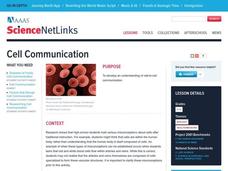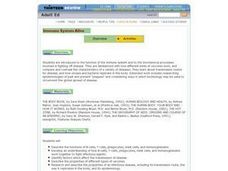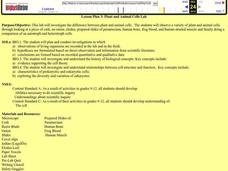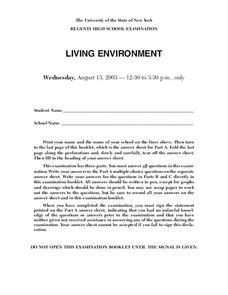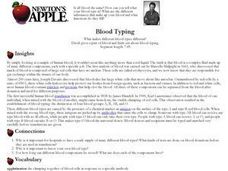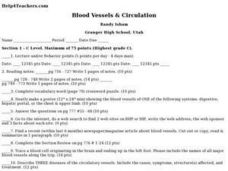Curated OER
Cell Communication
Students clarify common misconceptions about cells. They assess initial knowledge of cells and cell behavior, read and discuss an article and consider the role of cell communication in the diseases of diabetes, multiple sclerosis and...
Virginia Department of Education
Cell Parts
What do a bird, an egg, a rabbit, and a toad all have in common? This fun-filled resource explains the similarities and differences between cells and how all cells are similar, yet all are different. Learners begin by depicting a...
Curated OER
Regents High School Examination: Living Environment 2003
The living environment, from the interior of a cell to the complex relationships among populations, are queried in this final examination. Learners look at air pollution maps, diagrams of cells, population graphs, and drawing of cells....
Curated OER
Regents High School Exam: Living Environment 2008
Tne New York Regents High School Examinations are comprehensive and include various styles of questions, includingmultiple choice and the analysis of graphs. This particular version, the 2008 Living Environment exam surveys a variety of...
Curated OER
Making Blood!
Ninth graders study facts about human blood and what it is made of. In this blood composition lesson students divide into groups and complete several activities.
Curated OER
Immune System Alive
Students examine the function of the immune system. They read and discuss text, complete a K-W-L chart, sequence photos of white blood cells encountering bacteria, develop an outline, and write an essay.
Curated OER
Spotlight On Stem Cells
Learners discover the differences in how stem cells develop and function depending on their source. They see how scientists are using stem cells - from a variety of sources - to study how they can be used to cure certain illnesses and...
Curated OER
Regents High School Examination: Living Environment 2005
The 2005 version of the Regents High School Examination in the area of ecology is as comprehensive as previous years' exams. It consists of 40 multiple choice questions on everything from the structure of DNA to the interactions within...
Perkins School for the Blind
Human Body Regulation
The human body can regulate itself through sweating and resting. Learners with visual impairments discuss how the body changes when it is under stress and what it does to regulate itself. To start, kids use talking thermometers to take...
National WWII Museum
A New War Weapon to Save Lives
Young historians view and analyze photos and documents from WWII that are related to blood transfusions and blood plasma. A demonstration of correct and incorrect blood donors visually shows the importance of knowing blood...
Curated OER
Born of Blood: Inheritance of Blood Types
Students examine inheritance of blood types. In the chromosome activity, students create a model of chromosome and predict the blood type of offspring.
Curated OER
Plant and Animal Cells
Learners investigate the difference between plant and animal cells. They observe a variety o plant and animals cells by looking at a piece of cork, an onion, elodea, prepared slides of paramecium, human bone, frog blood, and human...
Curated OER
Living Environment
For this environmental lesson students complete a series of multiple choice and short answer questions on animal populations, cell structure and chromosomes.
LABScI
Circulation and Respiration: Vital Signs
What do your vital signs tell your doctor? An engaging hands-on lesson has your learners monitor their own lung capacity, blood pressure, and heart rate. They then connect the vital measures to the workings of the circulatory and...
Curated OER
Antibiotic Attack
Students examine how antibiotics work and why they are effective. In this antibiotic lesson, students discover that when harmful germs get inside the body, the immune system may not be strong enough to fight the germs off. Students...
Curated OER
Pre-Hardy-Weinberg
Students examine the inheritance of ABO blood groups. In this investigative lesson students perform a lab and show how natural selection can alter the gene frequencies in a population.
Curated OER
What's Your Type
Students record their blood types on a class graph and calculate the potential number of blood donors for each group.
Curated OER
Take A Heart Hike
High schoolers investigate the functions of different body systems. They conduct research about the major body systems to attain information. The teacher prepares the room for the lesson. Students walk and talk through each major system...
Curated OER
Blood Vessels & Circulation
Students participate in a layered curriculum designed lesson in order to study the cardiovascular system of the human body. The assessments and activities are student centered.
Curated OER
How to Make an Artificial Organ
Students design bionic organs or limbs. In this medical technology lesson, students view a video about artificial organs and prosthetic limbs. They research the medical technology behind these advances and work to design a organ or limb...
Curated OER
Circulatory and Respiratory Systems Unit - Biology Teaching Thesis
Students Explain how an increased level of activity translates to cells needing more oxygen and how the lungs supply this oxygen by entering the blood stream. They also can explain that the heart is responsible for moving both oxygenated...
Curated OER
Physiology of Reproduction
In this health worksheet, young scholars examine the human body and make mental connections to the target function highlighted in the sheet.
Curated OER
Mathematics in Bioengineering: Its Application for Today's Students
High schoolers explore the different fields of bioengineering. They will create and interpret graphs from cancel cells data. They then calculate the amount of drugs found in blood and eliminated by the body over time.
Curated OER
Circulatory System Design
Students identify the different parts of the circulatory system and their function. They work together to create their own model of the system and use it to determine the rate of blood flow. They answer questions related to their model.
